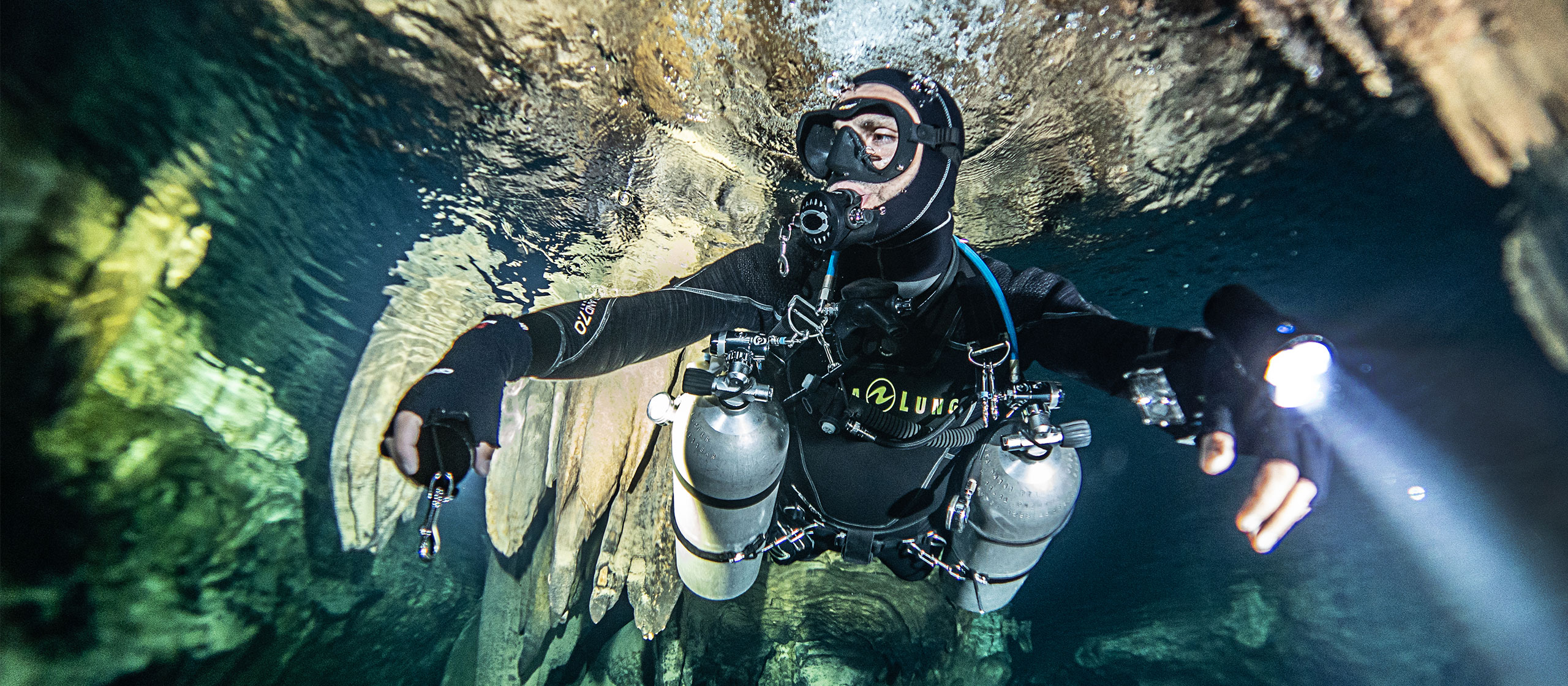Improving Diver Safety and Education: The opinions of a Pro
An Interview with Daniele Pontis, Instructor and Dive Centre Owner
What kind of dive industry do we, as passionate technical divers, truly desire? How can we create an industry that unites us in our love for the underwater world and preserves that world for generations to come? How can we ensure that the next generation of divers values education and responsible practices?
To answer these questions, I reached out to Daniele Pontis, owner of Bluforia, a dive centre nestled in the small idyllic seaside village of Cala Gonone. Over the past three years, I have had the immense privilege of working closely with Daniele, witnessing first hand his unwavering commitment to providing quality education to students.
He is not only a diver or a dive center owner; he is also a visionary, constantly seeking new horizons and challenging his own status quo. His extensive experience and profound knowledge have made him a trusted mentor to divers from all walks of life, including somehow (even if I’m almost a decade his senior) yours truly.
In our interview, Daniele shares his understanding of the challenges faced by industry professionals, and offers his ideas for the necessary, transformative changes needed to prepare the next generation of divers for technical diving.
We discuss the impacts of rushed and insufficient training in technical diving, how to improve training quality, who should take tech training, the role of human factors and the importance of diver apprenticeship and mentor programs. Here’s what the man had to say.
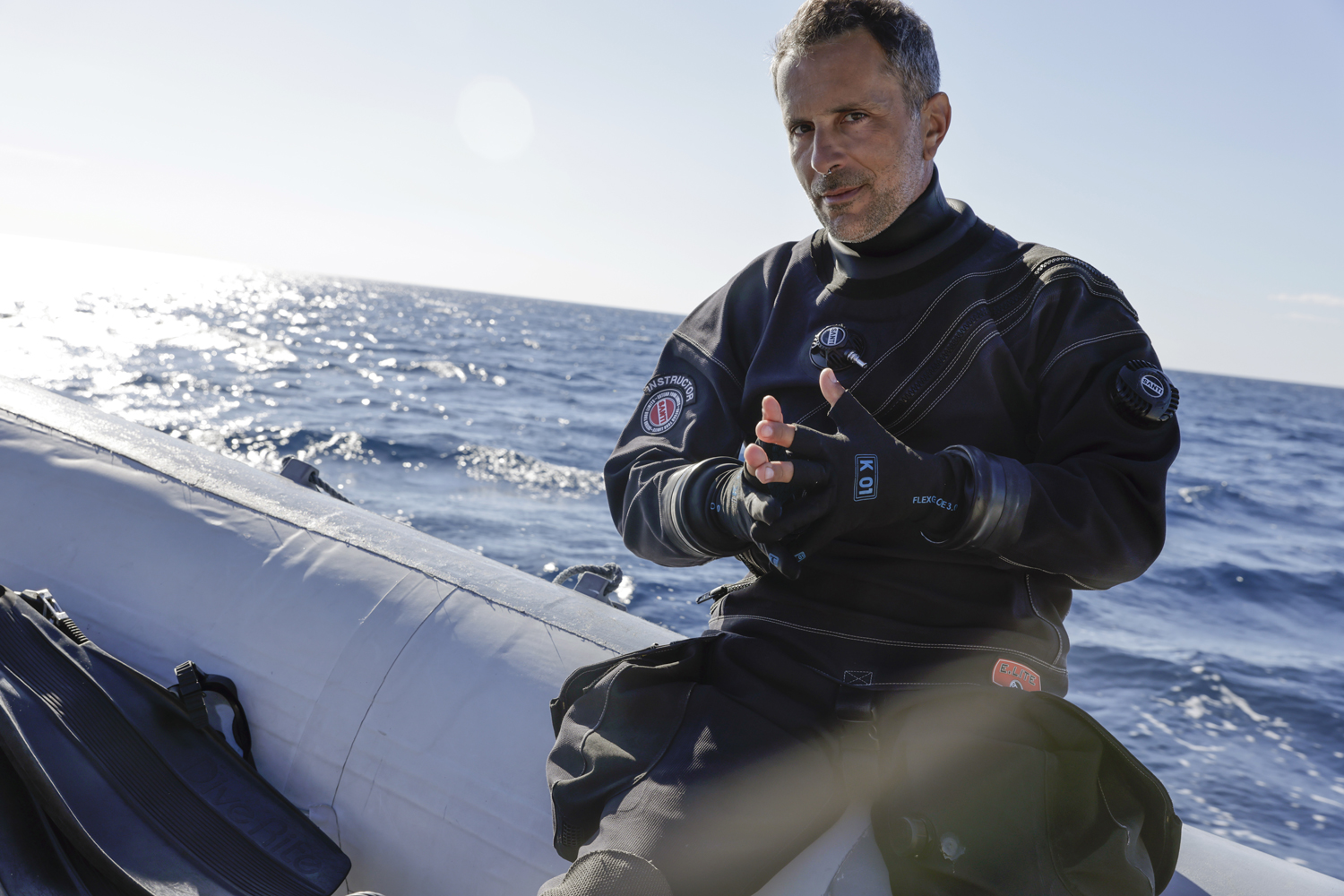
Photo by Stratis Kas
Act One: Diving Training in the Fast Lane
KAS: Let’s begin with a key question: What inspired you to establish Bluforia diving center in Cala Gonone, Sardinia, and how does it reflect your vision for the scuba diving industry?
Pontis: The versatility of the territory—territory that supports technical, recreational, and, of course, even true exploration diving. The territory offers unique opportunities through its rare geological variety. This is where my vision of the industry shines through. As far as I’m concerned, the variety of scenarios in this area helps develop skills and improve techniques that are foundational—both for divers and instructors. Our location is an ideal place to develop a contemporary way of teaching and diving.
Based on your experience, what are the consequences of rushed training in technical diving? How do they impact the maturation of divers throughout the certification process?
Well, there are two perspectives in identifying the consequences of “too fast,” “superficial,” and “unaware” training. Firstly, an evident one: inability due to lack of knowledge and skills that haven’t matured or been fully grasped. Or, even worse, were never taught so, therefore, were never learned.
The second consequence is inadequately trained divers who cannot [but try to] hide their incompetence. This latter scenario creates the most dangerous situations. These individuals have only superficial knowledge and skills, so they feel inadequate because they are. But they also feel the need to mask their incompetencies. And that’s where the problem arises. Even if capable and responsible professionals recognize the problem, they cannot address it if the student is unwilling to accept help or to engage in further learning.
Can you give a couple of examples related to cave diving and rebreather diving?
The most evident one is the lack of adequate general comfort in the underwater environment.
Nowadays, we often encounter technical divers who have an almost total lack of comfort in the water due to poor control of their body, mind, and even their equipment. They lack not just mastery but even basic control of their buoyancy, trim, propulsion, and, more importantly, breathing. But above all, they don’t know how to handle the equipment they are diving with. I mean anything from seemingly insignificant equipment parts to very critical ones, like their rebreathers. Just to be clear, I’m not only talking about divers but also instructors! And that’s the point.
We try to create a “change” in this industry by promoting individuals as examples [of excellence]—individuals that sometimes have significant problems with the quality of their diving. Their talent lies in promoting and selling specific equipment or training programs, but they lack the capacity to dive proficiently as any exemplary diver should. Certainly they may have other talents, but those are not diving or teaching. Teaching is a very delicate matter and carries immense responsibility.
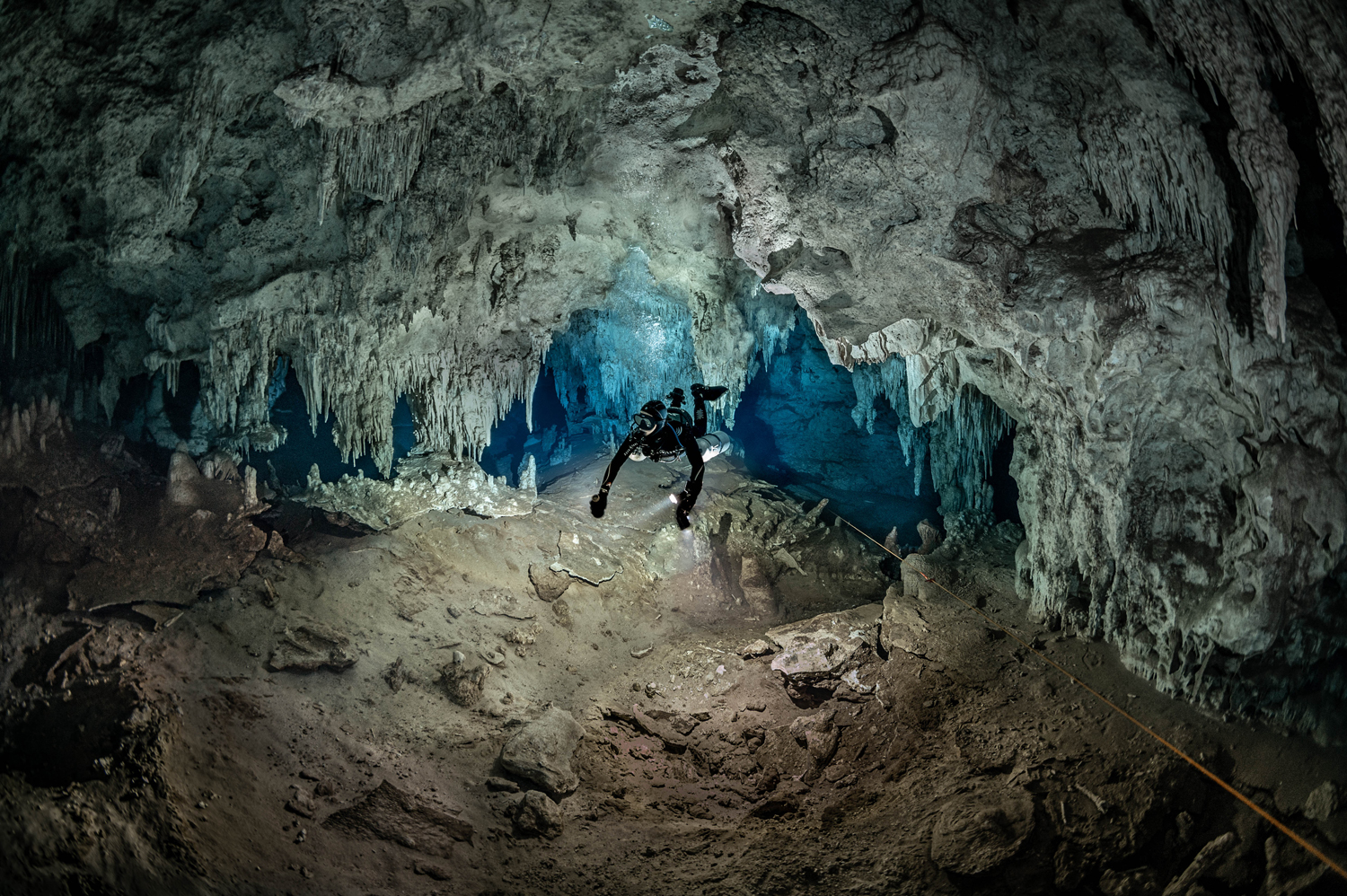
Photo by Mariona Yepes Daviu
Based on your experience, how can training programs in cave and rebreather diving be improved to address the issues of rushed training and ensure the maturation of divers throughout the certification process?
We should all take a step back. Do we want technical diving to be for “everyone?” Is that realistic? Let’s assume yes. That doesn’t mean anyone can teach it.
Teaching is not for everyone. Often when I talk to great legends of diving—explorers and important divers—they acknowledge their unwillingness and inability to teach! Well, if they, with all their experience, can recognize and admit they lack this talent, why should we be afraid to admit that the majority of divers are not prepared or capable teachers?
I imagine you also agree that not all students are suited to technical diving, right?
I totally agree. That’s exactly what I mean.
If we would strive to approach technical diving training with professional ethics and honesty toward the student, we would not allow the industry to produce inadequate instructors. And that’s the point: there can’t be technical diving for everyone if it’s taught by [just] anyone.
In the past, you’ve mentioned the importance of incorporating human factors considerations into scuba diving training. Could you elaborate on that?
Well, why would anyone exclude human factors? If they do, we have a big problem! I know that this [instructors ignoring human factors] is happening, and it is one of the biggest problems in diving teaching.
[Ed. note: “According to human factors specialist Gareth Lock, a human factors-centered approach seeks to understand and address why divers, instructors, and other key players behave the way they do. A psychologically safe environment is also a key component of Lock’s human factors approach: an environment where divers feel comfortable talking about their behaviors and mistakes, no matter their authority level.” See: What Are Human Factors?]
In what sense exactly?
It’s simple. Emulation. The Superhero Syndrome. This is our fault, though, because we have created and continue to create “superheroes.” And, we don’t know how to identify divers who only want to emulate without learning the necessary capabilities, mental strength, or training experience to be just like these idols they so admire. Quality training alone is not enough if it is not supported by personal experience, but above all, by the inner focus to control all these emotions. The superhero syndrome is extremely widespread nowadays because superheroes seem to set the benchmark for many.
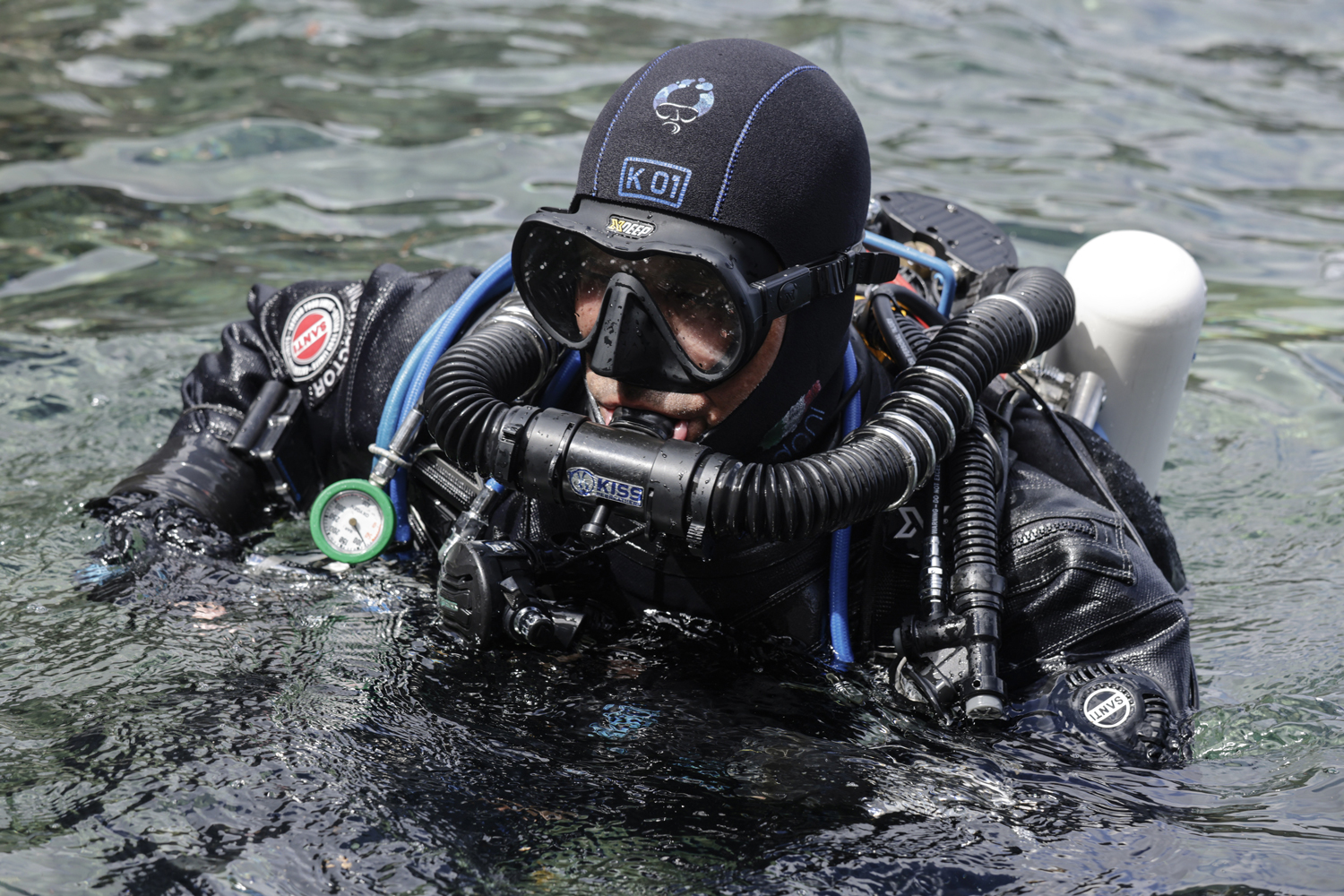
Photo by Stratis Kas
Understandable. It seems that social media has not helped but also increased this need to be seen and to imitate, as you mentioned, like the superheroes of the industry.
Certainly. It doesn’t help. But it’s very important to accept personal responsibility. Egocentrism, further facilitated by a stage like social media, is creating disasters. Many people don’t really understand what they see online. They just want to emulate something presented to them, often without any confirmation that it’s correct. As a consequence, it’s difficult to hold social media audiences accountable when they need to be. These messages are turning into marketing campaigns. And it’s a real shame, because most of those idolized individuals have great abilities and qualities, so they could convey a better message.
What innovative solutions have you developed or implemented at your dive center to address the challenges of rushed training and promote a comprehensive and effective learning experience for divers?
The simplest thing I did was to protect our dive center from market influences and economic captivity. Here [at Bluforia], we accept or reject candidate students and stop (or don’t even start) a training program when we consider the candidate’s experience or attitude inadequate. We have decided to teach while respecting all base standards and procedures—but we also provide them with knowledge and in-depth insights that guarantee a unique program for each person. Essentially, we actually do what everyone claims to do.
Ideally yes. But, well… So what about your opinion on the role of mentorship and apprenticeship programs in improving the training process for technical divers, and what benefits can they bring to the industry in general if they become more the norm?
Personally, I have been promoting mentorship for a long time, and I find it to be the most effective and comprehensive way to learn. However, it is idealistic to think that it can be used as the sole training option. Firstly, not everyone can dedicate themselves full-time, and secondly, we are professionals who make our living with this profession. Selling courses is our main, if not only, livelihood. Therefore, we need to be even more effective, responsible, and aware when communicating our know-how and experience, and try to ensure that it is received and interpreted the way that we intend it to be.
Could you share some thoughts on the importance of continuous training and skill development for divers?
Continuous training is still everyone’s dream. But we know that it is not always possible; and, in some ways, I believe training opportunities are still lacking. I am certain that when students have access to the best (and a wide variety of) instructors—when they expose themselves to new scenarios and philosophies—they can enhance and enrich their diving training. So, I believe that continuous training is incomparably critical, even if training opportunities are still limited.
How do you see the future of the diving industry, especially in terms of training and safety, and what initiatives or advancements do you believe will shape the industry in the future?
I see it as very uncertain. What has happened in recent years is a general decline in training. Technical diving is becoming “hybridized.” It is no longer seen as a conscious path or an in-depth expansion of our real skills. In the past, the same happened to deep diving—a “recreational” attitude compromised training and diminished the minimum abilities of a diver. But now—and this is something I never thought would happen—there is an evident loosening of the skills required to enroll in a technical or cave class.
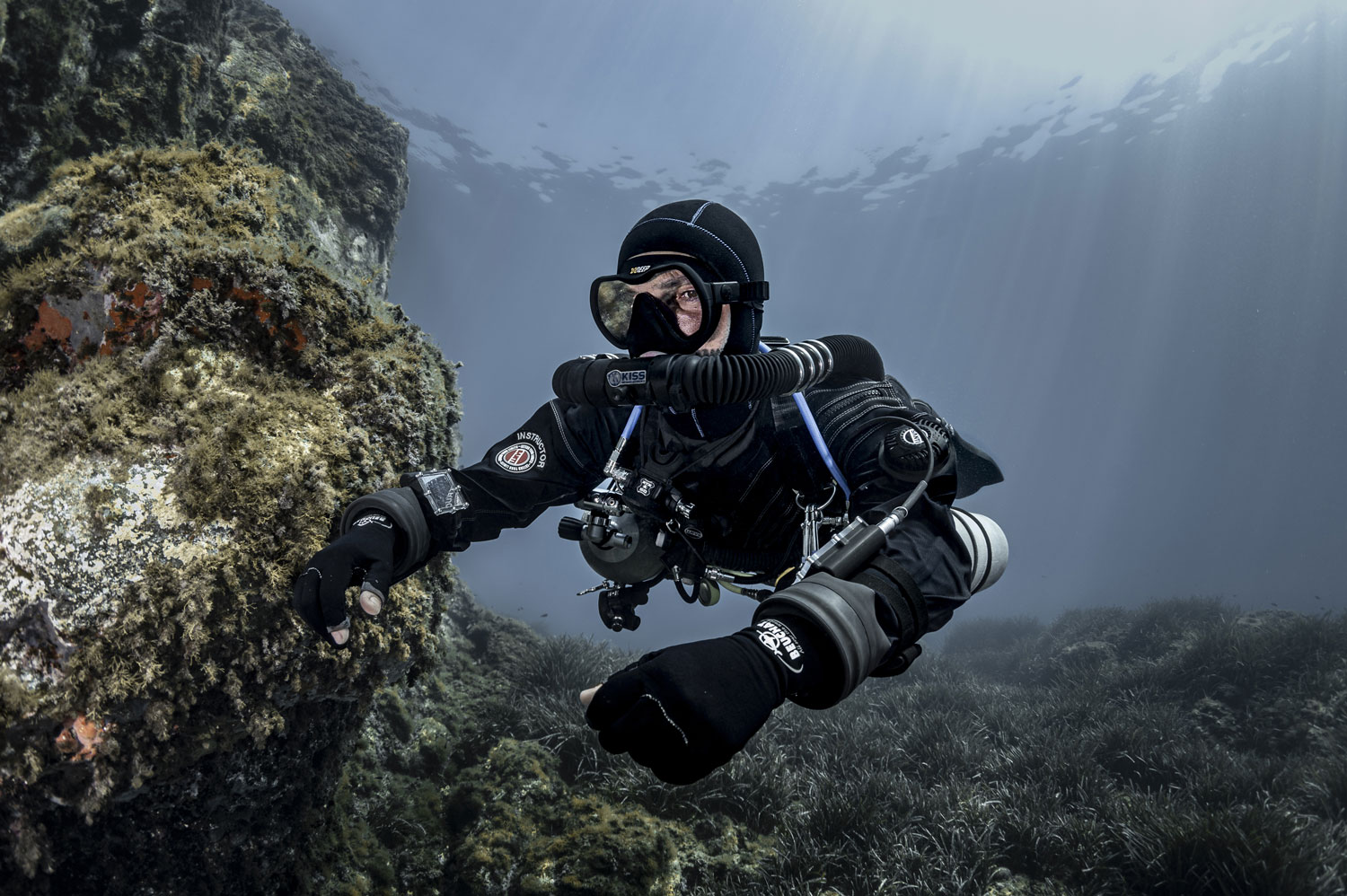
Photo by Mariona Yepes Daviu
Act Two: Dive professionals’ dependency on diving manufacturers and training organizations and the consequences
Many scuba diving centers rely heavily on specific equipment brands and certification organizations for training. Based on your experience, what are the advantages and disadvantages of this dependence?
The disadvantage, as you mentioned, is dependence. One must not confuse the quality of the product with the quality of the professional. Unfortunately, this is beyond most novice divers’ control. Even our dive center relies on certain brands, and we are happy to use certain products from the brands that we trust. With high-quality equipment, we feel more comfortable and can perform our work with greater conditions that allow us to deliver the best results. However, this does not mean that using or advertising these products guarantees the quality of the instructor. On the contrary, it is often misleading.
How does this dependence impact the choice of training, and how can a center like Bluforia afford to position itself as independent from any influences? Could you explain the motivations behind this decision and the benefits it brings to your center and the divers you train?
Well, dependence greatly influences that choice. Unfortunately, there is a risk of misinterpretation and believing anything that is being sold as good to be actually… good. There is an unfounded trust in what is being promoted. We consider ourselves independent because the equipment we rely on is a result of careful, personal research and not a marketing meeting.
The confusion arises when the quality of a professional is associated with the use of a specific brand. Often, the choices made by what social media now considers as brand “testimonials” distract divers who want to access quality training. When does it become an advantage to talk about specific products to our clients? When we transparently identify the pros and cons of these products and find solutions for overcoming these issues with our students. We don’t support anything a priori.
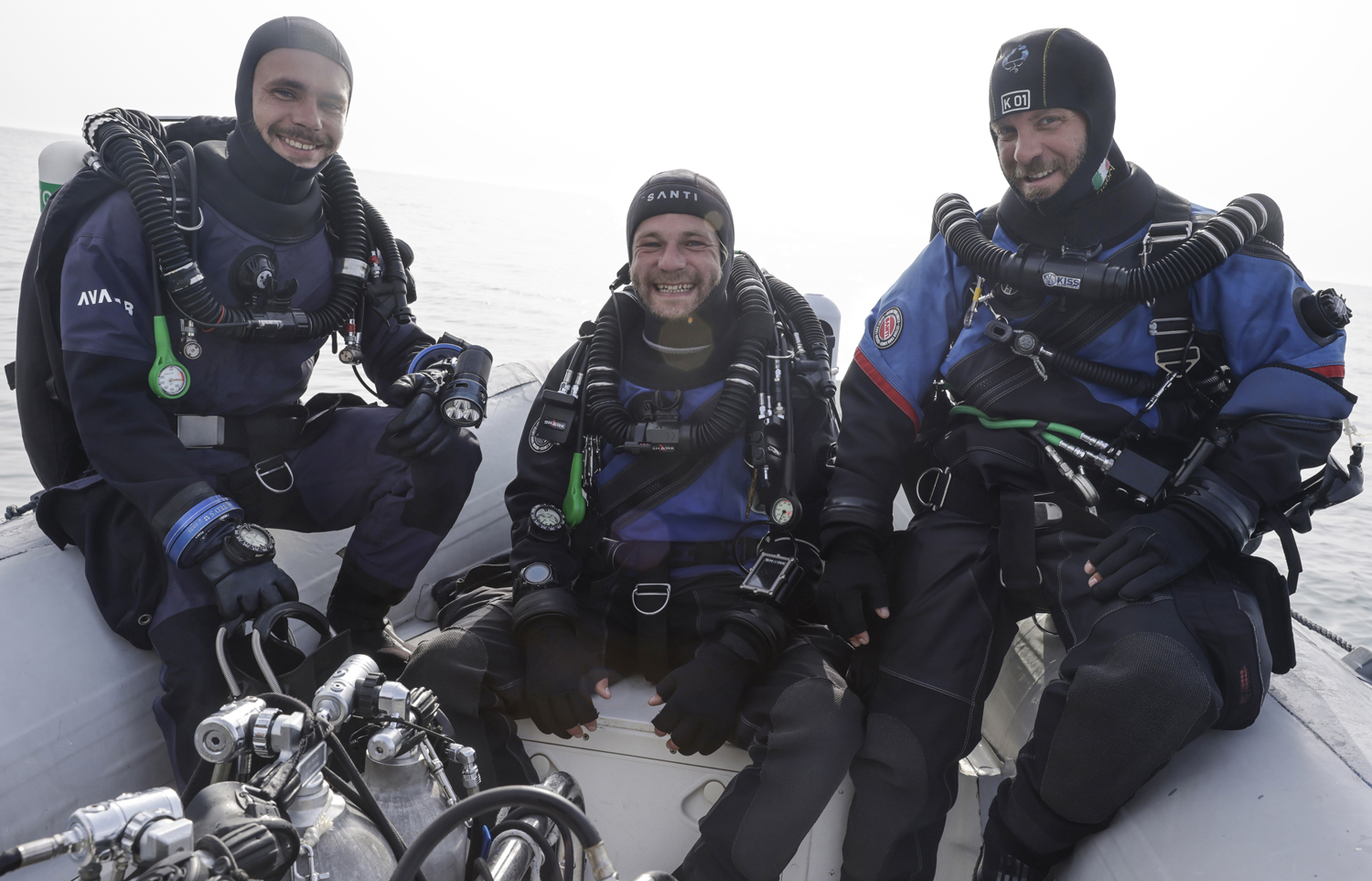
Bluforia Team by Stratis Kas
Act Three: Exploring values and egoism in the scuba diving industry
As a leader in the industry, you have undoubtedly faced numerous obstacles. If you could share a setback that has had the deepest impact on your growth as a diver and entrepreneur, what would it be, and what valuable lessons have you learned from it?
One of the most significant obstacles I faced was building a like-minded team I could rely on 100%. However, sticking to my own values about what diving and teaching should be has undoubtedly had the most profound impact on my growth as a diver and as an entrepreneur. I am committed to carrying this ideal forward without compromise.
The difficulty lies, as I have already mentioned, in dealing with misleading training that makes what should be approached with great effort and diver awareness seem simple and within reach for everyone. Economically, it is undoubtedly very tempting to take the latter approach, and not giving in has been very challenging.
We often talk about the positive aspects of the industry, but what is an uncomfortable truth or critical issue that you believe many divers and professionals prefer to ignore or overlook?
We mostly tend to talk only about the positive aspects of our industry. For me, an uncomfortable truth is that we are very egocentric. Beyond the economic aspect, we seek self-affirmation, often in a chronic and unfounded way, losing sight of reality. This is an important nuance in our industry: we are a bunch of egomaniacs!
Act Four: Epilogue
Daniele, before we conclude this interview, indulge me in the Bluforia philosophy—and more specifically, Daniele Pontis’ philosophy.
I believe that the main problem the industry faces right now is that we are trying to make every diver reach the same level. It’s not possible. There are benchmarks that simply are not and never will be attainable for some candidates. But the market has taught the students to ask for anything they wish—and at any time they wish—and to be disappointed when they are shown the proper, and often slower, process that they need to accomplish their goal. But they ask anyway. It’s like asking for strawberries in December.
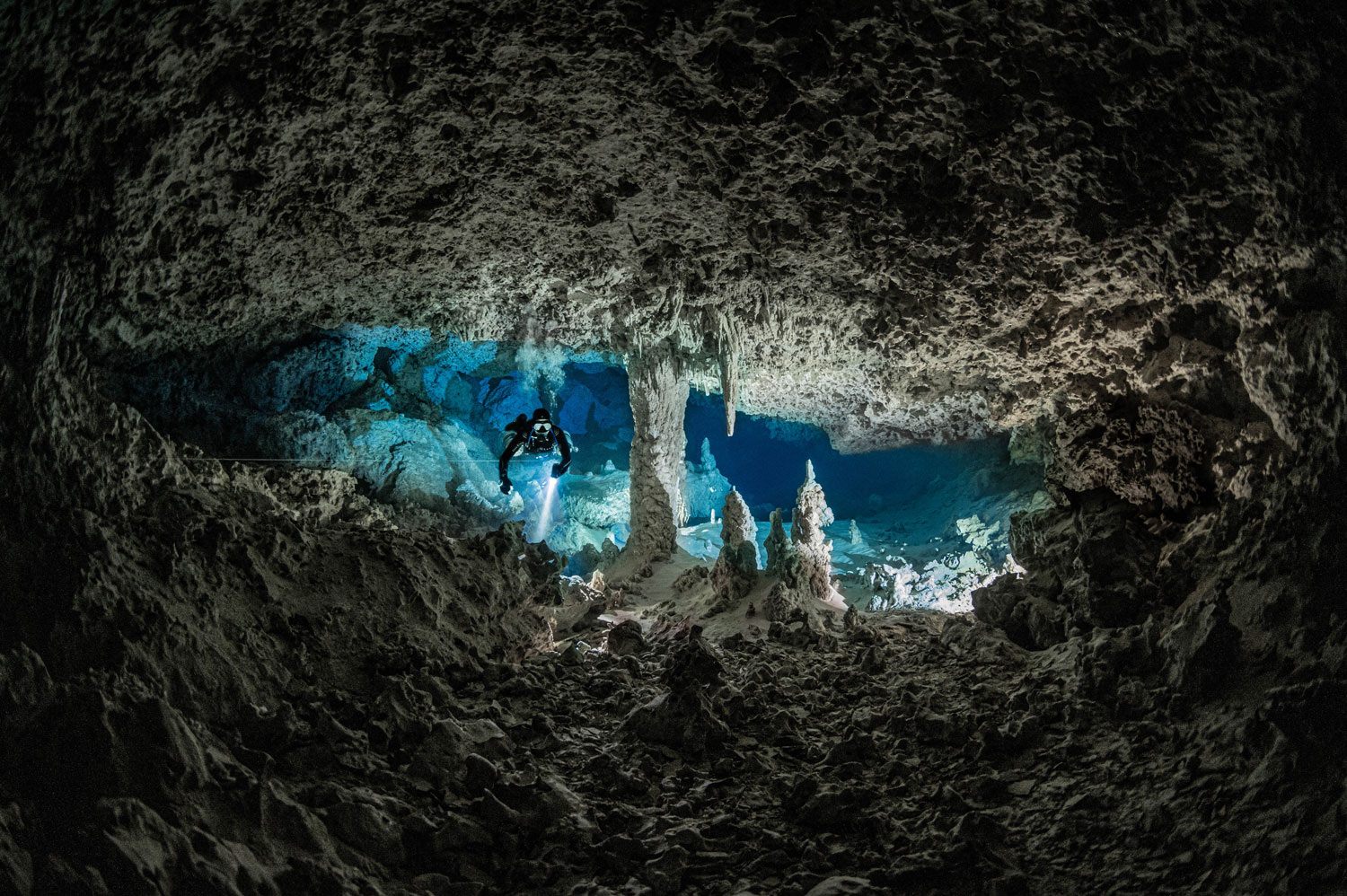
Photo by Mariona Yepes Daviu
“Strawberries in December”? Please elaborate…
“Strawberries in December” is a phrase that captures the essence of our approach at Bluforia. Just as strawberries are not naturally available during the Christmas season, we believe that diving training should not be rushed or provided at the wrong time just to please the customer. We resist the temptation to offer training that is not timely or appropriate, understanding that true mastery and development requires patience and is a comprehensive learning process. Our commitment goes beyond catering to immediate desires; it focuses on delivering thorough, high-quality training that ensures the safety, competence, and maturation of our divers.
Like savoring the sweetness of strawberries when they are in season, we believe in offering diving training at the right time and in the right way, creating an experience that is truly exceptional and meaningful. Every time I’ve eaten strawberries in December, they looked beautiful, they were a strong temptation, but they had no flavor, no value, they were empty.
In our field, we pursue visibility, citations, a place in history, and recognition. It would really take very little to make anyone fall in love with our work as instructors. But perhaps, this is not the moment. Nowadays, the ego is the biggest beast to feed.
Thank you, Daniele. I wish you a great season.
In the vast expanse of our diving world, the future of our sport awaits, and it is up to us to shape it.
DIVE DEEPER
InDEPTH: The Who’s Who of Sidemount: Daniele Pontis
About the author
Stratis Kas, a Greek-Italian professional diving instructor, photographer, film director, and author, has spent over a decade as an esteemed Advanced Cave instructor, leading expeditions to extreme locations worldwide. His impressive diving achievements have solidified his expertise in the field. In 2020, Kas published the influential book “Close Calls,” followed by his highly acclaimed second book, “CAVE DIVING: Everything You Always Wanted to Know,” released in 2023. Accessible on stratiskas.com, this comprehensive guide has become a go-to resource for cave diving enthusiasts. Kas’s directorial ventures include the documentary “Amphitrite” (2017), shortlisted for the “Short to the Point” Film Festival, and “Infinite Liquid” (2019), which explores Greece’s uncharted cave diving destinations and was selected for presentation at Tekdive USA. Kas’s expertise has led to invitations as a speaker at prestigious conferences, including Eurotek UK, Tekdive Europe and USA, Tec Expo, and Euditek. For more information about his work and publications, visit stratiskas.com.
About Daniele Pontis:
- Full cave instructor and CCR Instructor trainer at PSAI International
- KISS Rebreathers Sidewinder Instructor Trainer
- KISS Rebreathers Classic Instructor


